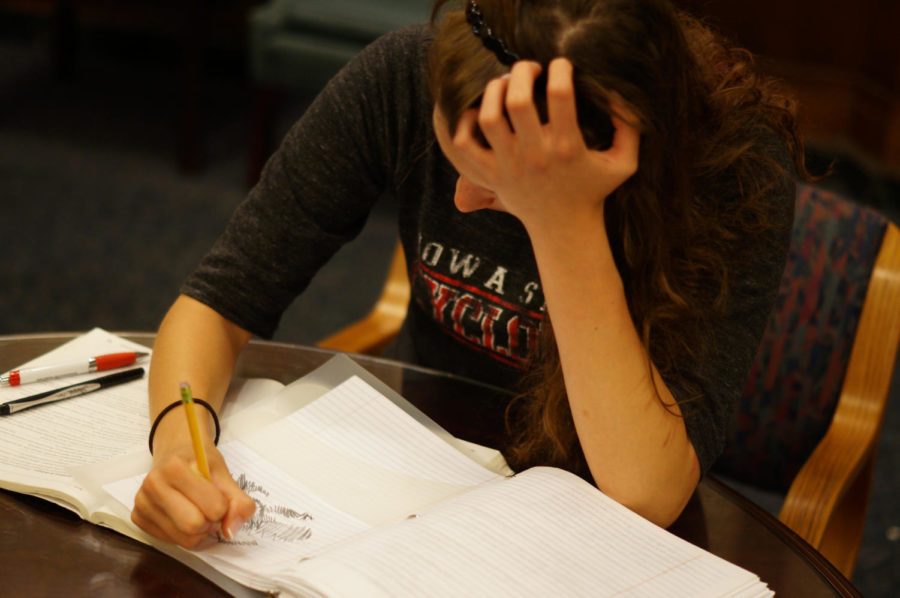Koenigsfeld: Get professionals’ help with anxiety
Photo: Jessica Langr/Iowa State Daily
Those who battle anxiety don’t always recognize what they’re doing to themselves by bottling up stress. That constrained pressure can release into terrifying episodes, or panic attacks, and sometimes have no trigger at all.
September 16, 2014
A week after the riot during Veishea, I entered the Iowa State Daily newsroom like I had every day for the past three years. I came in, sat down at my desk and plugged in a USB flash drive into the back of my computer. Then it felt like something snapped in my chest and my heart was going 160 beats per minute. I was overwhelmed with a feeling of doom.
What the hell was happening to me?
I immediately called for the editor to drive me to the hospital, thinking I was having a heart attack. Chest pains, sweaty hands, hyperventilation and dizziness all followed. As I made my way into the emergency room, my heart rate had slowed, my sweaty palms began to cool and I was starting to be able to breathe again. Little did I know I had just experienced my first panic attack and was on the road for a troubling bout with general anxiety disorder.
ISU football player Jacob Gannon recently came out with his story of his panic attack, which caused him to question his love of football and to leave team for a short time. On Sept. 15, it was announced that Gannon was back with the football team and had said he made a mistake by leaving in the first place.
Gannon told members of the media in a news conference Sept. 15 that “after going to counseling, [he] realized football wasn’t the problem. The problem was this anxiety.”
I, too, had the same feeling toward the Daily. Was my job as a managing editor and dealing with all of the breaking news we had causing me to be mentally unstable?
The answer was no. While the requirement to perform well on the football field or in the newsroom may add some stress, that wasn’t the sole reason for why we had our panic attacks.
I’m often asked “what does a panic attack feel like.” For me, it’s been a little different every time. But as I read the description given by Dr. Marc Shulman, physician for the ISU athletic department and one of the primary doctors for Gannon, I felt goosebumps on my arms because I was able to finally grasp the words. It is a perfect description of what is going on in a person’s mind when they’re having an attack:
“Picture yourself in a room with no air and a window at the far end and you will do anything you can to break through that window to get to the air. You kind of shut everything else out.”
Unlike Gannon, I refused for nearly 6 months to get help, telling myself I was fine and that it was a one-time occurrence. Since that panic attack in April, I’ve had seven more anxiety attacks, a few of which I told my friends and family about, and others which weren’t too severe and I never bothered mentioning. It wasn’t until an episode Sept. 12 when I began to question how stable I really was and realized what I was doing to myself wasn’t right. It was that moment when I realized there are hundreds — if not thousands — out there who are trying to bottle up the stress like I was and not getting the help they need and deserve.
The ripple effect of that Sept. 12 panic attack was unforeseeable. I missed the Daily’s weekly staff meeting — affecting my ability to do my job as the editor-in-chief — missed class and snapped at a few of my closest friends over a little dispute at the end of the day. I’m normally a guy who wears his emotions on his sleeve, but I knew something was really wrong after Sept. 12.
Sometimes it’s not even an issue of pride. I simply thought I was doing a fine job of managing the stress of working 60-hour weeks, going to class and trying to balance a social life somewhere in between. But I’ve now become more aware of just how brutal anxiety disorders can be.
Jacob Gannon is an ISU football player and he has anxiety. He’s getting help for it and is feeling better than he has in a while on the football field. My name is Stephen Koenigsfeld and I’m the editor-in-chief at the Iowa State Daily. I have anxiety and I’m getting help for it so I can start feeling better and helping those around me in my everyday life.
To the hundreds and thousands out there who are diagnosed or undiagnosed with any type of anxiety, you can do it, too. It may sound cliche, but it’s true. Don’t wait for the one panic attack to push you over the edge and risk it taking a bigger physical toll.
I won’t sit here and tell you everything is going to be 100 percent normal and you’ll never have another panic attack in your life. I won’t say your anxiety will be cured in just one day or week. But there are professionals out there who are available to help you cope with your anxiety in the future.
If sharing your stories of panic attacks or general anxiety helps you cope, feel free to share them on our Facebook page under this column.







